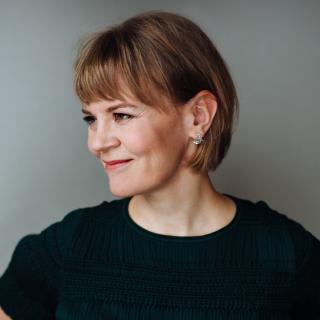The phenomenal trumpeter Håkan Hardenberger brings us Betsy Jolas’ new work. The evening’s programme also features Steve Reich’s latest orchestral work, which Susanna Mälkki premiered in Los Angeles.
Completed a year before his First Symphony, Sibelius’s Suite from King Christian II made Sibelius internationally known as an orchestral composer and paved the way for his symphonic career.
Steve Reich: Music for Ensemble and Orchestra
American Steve Reich (b. 1936), a leading figure on the contemporary music scene, was one of the creators of musical minimalism – music characterised by the hypnotic repetition and gradual variation of short motifs. Of the work on today’s programme he says:
“Music for Ensemble and Orchestra is an extension of the Baroque Concerto Grosso where there is more than one soloist. Here there are 20 soloists – all regular members of the orchestra, including the first stand strings and winds, as well as two vibraphones and two pianos. The piece is in five movements, though the tempo never changes, only the note value of the constant pulse in the pianos. Thus, an arch form: sixteenths, eighths, a Ghanaian bell pattern, eighths, and sixteenths.”
The piece was composed in 2018 as a joint commission from six orchestras: the Los Angeles Philharmonic, London Symphony, New York Philharmonic, San Francisco Symphony, Sydney Symphony and Baltic Sea Philharmonic. Susanna Mälkki conducted the Los Angeles Philharmonic Orchestra at the world premiere performance at the Walt Disney Concert Hall in 2018, and it can now be heard in Finland for the first time.
Betsy Jolas: Onze Lieder
“My roots are in the entire history of music, not just in contemporary music. I feel privileged to be related to all that great music of the past,” said Franco-American Betsy Jolas (b. 1926) in an interview in 2016. On another occasion, she claimed to have found inspiration in the works of such composers as Monteverdi, Debussy and Schumann. Winner of the Koussevitzky and Maurice Ravel Prizes, she has also been awarded some of France’s highest honours in recognition of her services to music. She studied in France and the USA and later taught in both. Her compositions range from operas to orchestral, chamber, vocal and choral music. Recent works include two string quartets (2018 and 2019). Jolas composed Onze Lieder (Eleven Songs) for trumpet and chamber orchestra in Paris in 1977, and the soloist at the premiere with the Ensemble Intercontemporain conducted by Michel Tabachnik was Pierre Thibaud. Despite its title, the piece is in a single movement. The trumpet’s “songs” are sometimes dreamy, sometimes caustic.
Jean Sibelius: King Christian II (suite), Op. 27
February 1898 saw the premiere at the Swedish Theatre in Helsinki of a play called King Christian II by Adolf Paul, a writer who was born in Sweden but grew up in Finland. He got to know Jean Sibelius (1865–1957) while studying in Helsinki in the 1880s and they kept in contact when Paul went to live in Berlin. Sibelius composed four pieces of incidental music for the play (Elegy, Musette, Minuet and Song of the Cross-Spider) and conducted the theatre orchestra. He later added three more numbers (a Nocturne, Serenade and Ballad) and the combined suite, and especially the Musette, became a considerable hit in its day.
The play is loosely based on true events. Christian II was King of Denmark and Norway 1513–1523 and of Sweden 1520–1521, when he was deposed. After the Stockholm Bloodbath of 1520, he was known as Christian the Tyrant. The other leading character is his mistress, Dyveke, who died in dubious circumstances – in Paul’s version she is poisoned.

